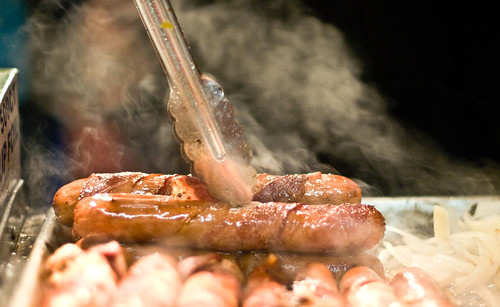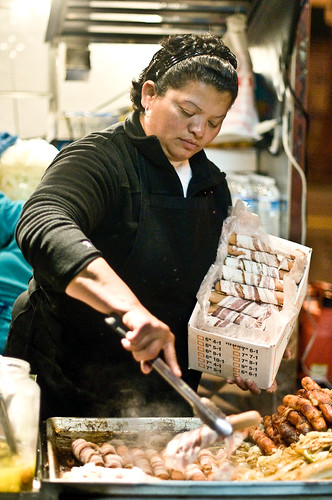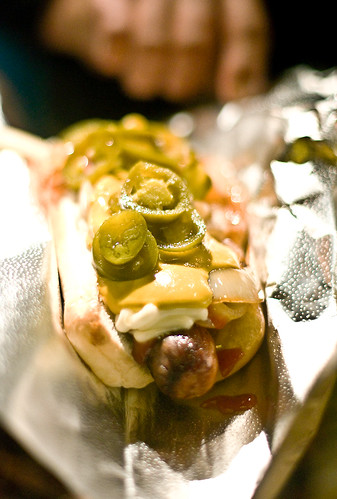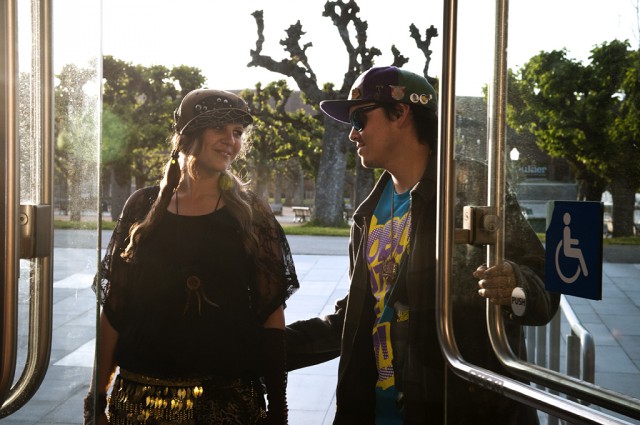
“They have a lot of hot dogs in New York and Chicago, but they don’t have bacon-wrapped hot dogs.” he states. “Chicago hot dogs are better than New York hot dogs, but this hot dog is better than both of those.”
Gonzalez and Arrellano have been running their vendor business, Leo’s Hot Dogs, for five years. They have two locations. On Mondays and Tuesdays they sell dogs in front of the 24th Street Mission BART station, and on weekends they move the truck up to 19th.
The couple worked their first two years without permits from San Francisco’s health department, but eventually had to obtain the right paper work in order to keep the business going. They are currently the only hot dog vendors in the Mission with the proper permits. Other food peddlers remain unregistered because they aren’t willing to pay the extra fees to legitimize their business.

Bacon-wrapped hot dogs go by many different names, including TJ Dog, Tijuana Hot Dog, Street Dog, Dangerous Dog, and Dirty Dog. The bacon-wrapped hot dogs are originally from Mexico, According to Ruth Ross-Merrier, a culture writer for Mexconnect and columnist for the Guadalajara Colony Reporter. In her article, “The rise and almost fall of the hot dog in Mexico,”it said American entrepreneurs introduced Mexico to hot dogs after purchasing a concession stand at the Plaza Mexico City bullring in 1943.
Other food peddlers eventually started selling hot dogs, but this time added their own toppings such as cheese, jalapenos, and homemade salsa. In 1956, an unidentified hot dog cart in Mexico City’s Parquet de la Alameda began serving bacon-wrapped dogs to employees of the newly constructed Torre Latino Americana.
“In the past vendors weren’t allowed to sell bacon-wrapped hot dogs because some unregistered vendors would cook them in an unsafe manor,” says Rajiv Bhatia, the Director of San Francisco’s Health Department. “There were several cases in which vendors wouldn’t wear gloves, use dirty utensils, or operate in areas without permission.”
A few years ago food vendors were allowed only the options of boiling or steaming their hot dogs. San Francisco’s new code, implemented by the Board of Supervisors in January 2011, now states vendors can grill their hot dogs as long as the food preparation is up to code.
San Francisco’s health code under article 113818 states vendors cannot cook non-prepackaged food, reheat old items, grind raw ingredients, and must wash any vegetables used. State law requires the food peddlers to get a trailer that can cost up to 45,000 dollars— the equivalent of 15,000 sizzling franks— instead of the bacon dog purveyors’ current propane-powered-cookie-sheets-on-wheels contraptions, which seem to attract swarms of bar-hoppers.
The legislation around street vending, from the Departments of Public Health and Public Works, has become significantly less prohibitive, according to Daniella Sawaya, a mobile food associate from La Cocina.
“For a lot of the traditional hot dog vendors in the Mission, the barrier seems to be the costs of the permits,” explains Sawaya.

Gonzalez and his wife are now able to sell their hot dogs in front of their truck.
Unlike the illegal vendors, food peddlers with permits not only have to submit to the occasional health inspector, but also to the police and fire department as well. Before the couple obtained the permit for their business they were constantly harassed by police officers.
“Since we’ve become legitimate, it hasn’t been so bad,” Gonzalez says.
The new codes don’t seem to bother the small business owner. “The problem is the illegal food vendors taking our customers,” Gonzalez says. “I don’t think it’s fair that we pay all these taxes and maintain our reputation, while they don’t contribute anything to the city.”
Gonzalez and Arrellano aren’t the only food peddlers struggling in the Mission.
“I would buy their hot dogs every Friday and Saturday night,” Torres says. “I prefer their hot dogs because of their freshness and cleanliness. I’ve known them since they’ve started their business and we’ve always looked out for each other.”
Arrellano and Torres link arms as they leave the hot dog stand.





Cleaner For Laminate Floors • Jan 20, 2013 at 8:19 pm
Normally I don’t read post on blogs, but I wish to say that this write-up very forced me to check out and do it! Your writing taste has been amazed me. Thanks, quite nice article.
Iraqi Dinar • Jan 12, 2013 at 4:49 pm
Thank you sharing these kind of wonderful discussions. In addition, the optimal travel and medical insurance program can often relieve those concerns that come with touring abroad. A new medical emergency can shortly become very expensive and that’s bound to quickly decide to put a financial impediment on the family’s finances. Putting in place the best travel insurance package deal prior to setting off is well worth the time and effort. Thanks a lot